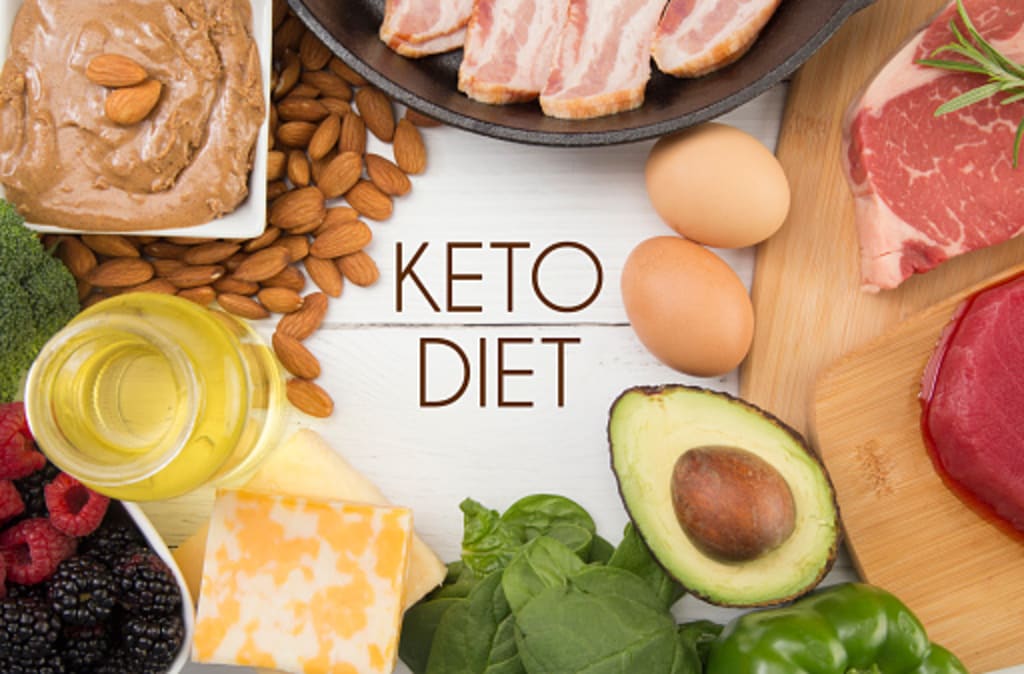Unveiling The Ketogenic Diet
Exploring the Science Behind Ketosis and Fat Adaptation

Introduction:
The ketogenic diet, sometimes referred to as the keto diet, is a low-carbohydrate, high-fat diet that has grown in popularity in recent years. This essay will go through the ideas and possible advantages of the keto diet in detail. We'll go over its macronutrient composition, the metabolic state it causes (ketosis), and the numerous benefits and drawbacks of following this diet.
By limiting carbohydrate consumption, the body is pushed to seek alternate energy sources. When carbs are available, the body normally turns them into glucose, which serves as the principal fuel for many biological operations. When carbohydrate consumption is reduced on a keto diet, the liver begins generating ketones from stored lipids. These ketones act as an alternate fuel source for the brain and other tissues, resulting in ketosis, a metabolic condition.
The keto diet is distinguished by ketosis, which is essential to its physiological benefits. The body becomes extremely effective at burning fat for energy while in ketosis. This might lead to weight loss when the body uses up its fat reserves. Ketosis has also been proven to increase insulin sensitivity and blood sugar management, which may have consequences for those with type 2 diabetes or insulin resistance.
One of the key advantages of the keto diet is the possibility of weight loss. When carbs are reduced, the body enters ketosis and becomes more effective at using fat for energy. This can result in faster fat loss and a lower overall body weight. Furthermore, the diet's high fat and moderate protein consumption can lead to improved satiety, potentially lowering overall calorie intake and assisting in weight management.
Although high-fat diets were once associated with an increased risk of heart disease, recent research suggests that the quality of fats consumed may be more important than the quantity. The keto diet's inclusion of healthy fats, such as monounsaturated fats and omega-3 fatty acids, may have a beneficial impact on cardiovascular health markers.
contents:
Macronutrient Composition: The keto diet is primarily focused on three macronutrients: fats, proteins, and carbohydrates. However, it severely restricts carbohydrate consumption while emphasising high-fat and moderate-protein consumption.
a. High Fat: Healthy fat sources such as avocados, nuts, seeds, olive oil, and fatty fish are abundantly consumed. Fats account for approximately 70-80% of total daily calorie intake.
b. Moderate Protein: Protein intake is maintained at 20-25% of daily calories. Meat, poultry, fish, eggs, and dairy products are good sources of protein on a keto diet.
c. Very Low Carbohydrate: Carbohydrate intake is severely restricted, typically to less than 50 grammes per day. This reduction causes the body to enter a metabolic state known as ketosis.
Ketosis and Metabolic Adaptations: Ketosis is the physiological condition produced by the keto diet, in which the body switches its major fuel source from glucose generated from carbs to fats and ketones. This change happens as a result of the restricted supply of glucose.
a. Fat Adaptation: When carbohydrate intake is reduced, the liver creates ketones from fats, which serve as the body's alternate energy source.
b. Ketosis Benefits: Ketosis has various advantages, including effective fat utilisation, greater insulin sensitivity, and a potential decrease in hunger due to increased fullness.
Weight Loss and Metabolic Advantages: The keto diet has grown in favour as a weight loss method. It has several processes that help with weight loss and beneficial metabolic improvements.
a. Lower Insulin Levels: A low-carbohydrate diet lowers insulin levels, which promotes fat breakdown and inhibits fat accumulation.
b. Improved Fat Oxidation: Ketosis allows the body to use stored fat as an energy source, which aids in weight reduction.
c. Increased Satiety: The keto diet's increased fat and protein content may promote satiety, lowering overall calorie consumption.
d. Better Blood Sugar Control: Research indicates that the keto diet may assist people with type 2 diabetes by reducing blood sugar levels and increasing insulin sensitivity.
Potential Health Benefits and Considerations: While weight loss is a major benefit, the keto diet has showed promise in a variety of other health areas.
a. Epilepsy: The ketogenic diet has long been utilised as a treatment for drug-resistant epilepsy, particularly in youngsters.
b. Neurological illnesses: Research suggests that ketosis may have neuroprotective benefits, potentially benefitting illnesses such as Alzheimer's and Parkinson's disease.
c. Considerations and Risks: The keto diet may not be ideal for everyone, and it is necessary to speak with healthcare specialists before embarking on this nutritional regimen. Potential adverse effects, such as "keto flu" during the early transition phase, should also be considered.
Conclusion:
The ketogenic diet, with its emphasis on high-fat, moderate-protein, and extremely low-carbohydrate consumption, provides a unique approach to nutrition and metabolism. It induces ketosis, which can result in weight loss, better blood sugar control, and a variety of other health advantages. However, the keto diet must be approached with caution.





Comments
There are no comments for this story
Be the first to respond and start the conversation.